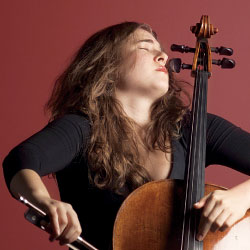
Alisa Weilerstein strides through the door in high heels and a gauzy dress, and heaves her cello off her shoulder with the air of someone who would rather be wearing a sweatshirt. She’s in New York for the afternoon for a benefit performance and a quick visit to the old neighborhood, which she’s barely had to time to grow nostalgic about. Weilerstein graduated from Columbia four years ago and immediately hit the road. At 26, she’s arguably Yo-Yo Ma’s heiress apparent as sovereign of the American cello. For now, though, she is a pre-star, building her career with due deliberation. She gives her first Zankel Hall recital on December 9.
The daughter of a pianist and the longtime first violinist of the Cleveland Quartet, Weilerstein was born into musical nobility. Her parents are also her chamber-music partners; they tour together as the Weilerstein Trio. “Many people assume that they put the cello in my hands because it would complete a trio, but that’s not it,” she says. “I begged them for a cello when I was 4. They didn’t immediately discourage me by forcing me to practice seriously. It was a toy: I’d bang around on it for hours, and I taught myself the opening of the Dvorák concerto, even though I couldn’t even finger the chords.”
She is still making no concessions to youth. Weilerstein made her New York Philharmonic debut last January with a serenely poignant performance of Elgar’s doleful Cello Concerto. Six months later, she became known to Mostly Mozart audiences with Azul, a beguiling concerto that the composer Osvaldo Golijov was still feeding to her, page by newly revised page, shortly before she walked onstage. “Two days before the concert, I was freaking out because I didn’t know what I was supposed to play,” she admits.
For her Zankel recital, she has chosen an intense and passionate program of Beethoven and Chopin sonatas (which she will perform with the pianist Inon Barnatan), a short piece by Golijov, and Golijov’s Omaramor sonata for solo cello. Choosing to play that last piece, in which the instrument dances, roars, and lapses into bleak soliloquies of ghostly beauty, is a tacit challenge to anyone who might think that musical insight comes only with age. “Some people will say, Oh, she couldn’t possibly have the life experience to play that. Well, of course I’ll play it differently in twenty years, but it would be a shame to go into a concert with a prejudice like that.”
Alisa Weilerstein
Zankel Hall; December 9.
